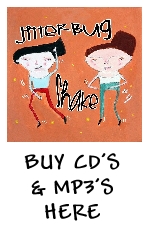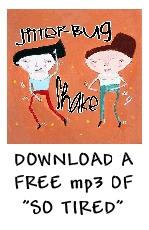
- Rick Shaffer, hello and welcome to our page once again! Of course, last time I only reviewed the music from your latest album Jitterbug Shake — we haven’t had the formal introductions and chance to talk yet, so truly, welcome and thank you so much for your time and for talking to us all. We can link people to the music in this interview, and we can link them to MY REVIEW of the album, but what we don’t have the ability to do is describe your music from YOUR perspective. When people ask you what kind of music you make, how do you answer and entice them into listening? If you were to pinpoint what separates your music and makes it identifiable to your own signature sound and style, setting you apart from the rest of what’s out there, what comes to mind?
Hello, Jeremy. I’d have to say a “rocker” and “sonic minimalist” who is delivering the gospel in a unaffected blues narrative, wrapped in a “Bukowski “styled lyrical element, with slashing distorted guitars, and a driving reckless abandon beat. Kinda like if you put Hasil Adkins, Link Wray, Slim Harpo , Early Stones/Pretty Things, The Stooges and production influences like Joe Meek, Chess Records, Phil Specter and Jimmy Miller in a blender. The result would be the concoction we’ve got going on Jitterbug Shake. I think we all get influenced by other artists, build our sound, growing as we move down the road, and it becomes what your sound is, and I tell other artists, “You’re the only one who’s gonna define you, unless you wanna be a fuckin’ human jukebox.”
- You’ve obviously got an INTENSE love for the guitar and must have studied it your entire life to be able to play as well as you do now and get those incredible tones, so where did it start? Describe that first axe to us, did you know right then and there that you were going to be hanging onto a guitar for the first of time? What triggered the eventual love for guitar and intense practice and study?
I became aware very young that the music thing had excitement. My brother played guitar and I would go to gigs, hang out with musicians, see gear and records lying about, thinking — this is a world I want to be in. My first electric guitar was a Danelectro single pick-up with the case. I saw it in the back of a car and it was for sale for $25 bucks. l later traded the body for a Danelectro Longhorn like Link Wray played. The love is being able to express with the noise, the beat and the buzz you get putting it together, and hearing it evolve.
- You make rock with a good-time, party feel to it, how much do you connect with your music on an emotional-level? Good-times are emotional aspects too of course, but how deep does it get? Within the context of the albums you’ve released, how personal of an album is Jitterbug Shake in comparison? Do you feel it’s important to include that personal side of yourself within the music, or is it just simply time to rock?
Yeah, it does rock, but the narrative runs deep in the grooves, like on the track Sure Thing it’s self-explanatory. It’s the old saying, “There’s only three things in life, taxes, death and trouble.” Musically it’s Slim Harpo in some driving mash-up of “King Bee” energy. So, yeah, it rocks, but something’s going on lyrically. The turnaround is that on the surface it’s no sure thing, then the bridge is, “And I just ain’t satisfied,” still searching, even though there’s no sure thing, its an endless struggle. If I deconstruct the song/production process it starts with the Harpo groove, some Brian Jones style slide, distorted choppy rhythm guitars, some Jimmy Reed harmonica, Excello Records percussion/reverb, and a howling vocal. Through those elements comes the sound. And, the other part is an immediate recording approach and feel, the vocal is live, no punch in or auto-tune. Then I moved on to sound and parts, after laying down the rhythm, not kicking back thinking “what should I do next.” I never overthink it.
- A lot of people carry around the misperception that having a ‘throwback’ or ‘old-school’ sound means that there’s nothing new that the music can offer. Can you explain to the fine people out there that feel that way how this is a bullshit theory?
Fuck, give it a name. I’m creating this now, not doing Chuck Berry covers! My production approach, sounds and vision is in my head and, hey kids, this is NOW, not some “oldies revival.” If you never watched the 1965 Godard film “Alphaville,” or heard the “Mississippi Sheiks,” then is it new to you today, or is it old because of the date the work was released? We all take in and build from each other to grow a unique sound. Bob Dylan is the perfect example, he’s done exactly that for a very long time.
- Jitterbug Shake is your sixth solo-release! How do you feel the overall sound and scope of what you can achieve has changed from the first record you recorded on your own to this latest one? Looking back on it now and listening, is there anything you can think of that you know now that you wish you did then? Conversely, are there things you learned throughout recording these albums over time that you know are actively helping or guiding you when recording now?
The sound changes are fluid and evolving, while the material/song drives the vision and production. No, I don’t wish or look back. The whole process is a learning curve for every album, and each is an individual creation, not a formula.
- What about on a personal-level? I’m assuming that over the span of six solo albums and that length of time, that you’ve also grown and evolved as a person during these years, but what I’m wondering is if you found any parallels between the way music evolves, and the way live evolved around it for you? Perhaps unknown to us, do you feel that the songs you’ve recorded over time tell somewhat of an autobiographical history, or like an ongoing journal of your life? How so, or why not?
The biggest growth in both areas throughout the years has been to be in the moment, and not to worry about what I can’t control. All the material is related to what has or is happening in my life. I connect with the place that is the stream of conscientiousness where thoughts and words flow and merge together and become songs.
- Alright Rick, I gotta ask. Assuming you’ve read the review we did on your album, I’m wondering what you thought about my first impressions of where the actual word ‘Jitterbug’ kind of came into play. How did it make its way to the name of the album? Normally that’s not a question I get into all that often, but in my brain a ‘jitterbug’ sounds different than what you put onto that record, so I’m curious as to how you feel that it represented what you were doing this time around?
I did read your review, and the impression of “Jitterbug” is yours not mine. I can say you got the point that the sound has nothing to do with Brian Setzer (a lovely fellow and talent). The frantic energy of the actual jitterbug dance, combined with the Hill Country groove led me to the name Jitterbug Shake.
- I’m also definitely wondering about authenticity itself. How would you define it from a personal-level? Listening to your music, it was astounding to hear how ‘ripped-from-the-wormhole-of-time-and-space-itself’ it all sounded, but I’m curious as to know if YOU personally feel authentic in the music you make, as per however you might define it. I commented in the review on Jitterbug Shake about how it seems like you might be the kind of guy that just rolls out of bed each morning ready to rock from the moment the sun comes up, but you tell us how you see it from your side. Is it tough to separate the man from the musician?
I guess we’ll find out in time, if the music resonates in the long run. Of course it’s authentic, or I couldn’t live with myself otherwise. It’s about commitment, passion to the sound and doing what I love until it kills me. The man is the musician, or the musician is the man. Or, is this the beginning of the end, or the end of the beginning — they both exist, in equal parts.
- One could infer from the listed influences and comparisons to your work, that you might not necessarily have the greatest opinion of modern-day music, or at least present-day sounds outside of rock maybe? Of course these are all assumptions, I’ll need you to set the record straight on this. The overall throwback sound of Jitterbug Shake really did get me thinking though, and I started to really wonder what you thought of the music out there, in this past decade let’s say, good, bad, ugly, what do you think about the music being made and finding popularity in our world today?
Ahhh, there you go “throwback sound,” or let’s say, Neo-Garage Blues — a modified sound. There’s good and bad, and it would be an easy assumption, but I appreciate lots of different styles and sounds, especially indie music. Today’s popularity-of-the-day means very little to me. Artists like Van Gogh, Poe, Emily Dickinson and Thoreau all died without any recognition, but that doesn’t diminish their work. Popularity has little to do with the quality and longevity of an artist’s work.
- I’d be remiss if I didn’t ask one of my favorite questions of solo-artists to you too, Rick. Often in a solo-situation, there’s a person at the root of it all, that doesn’t always play nice with others, or can’t handle too many cooks in their kitchen, have to be the captain of their own boat, you know what I mean. Is there a control-freak hiding in behind it all Rick? What’s got you out of playing in band situations and staying on the solo-path?
Well, you’d be wrong relating that idea to my work. I don’t need to be “captain” and I love working with other artists. Being in a group like The Reds comes with commitment, responsibility to each other, and a much larger financial equation. For me the reality is, “Mo people, mo problems.” To be honest though, it just fell this way, I had ideas, a strong work ethic and songs I wanted to write and record. I like working with the video visual artists, the painters who do the jacket art, photographers and, of course, the musicians and engineers. I know what I want, but it’s never my-way-or-the-highway. I’m open to the ideas of the other musicians in the recording studio.
- Does it make it tough to get out on the road without a permanent band to get out the full-sound onstage? Do you adapt the sets to where you can play them completely solo? How does it work when you’re playing live, and are you planning on a tour to support Jitterbug Shake in these last five months of 2015? What’s coming up for you Rick? Let us in!
Being on the road is tough. I have no plans to play live because life on the road is a whole other world I’m not ready to plug into right now. My next project is a visual piece I’m very excited about because I’ll be working with one of my favorite people, British artist/director, Peter Mc Adam. Peter developed a really unique visual process he named iCoda that he’s using for the So Tired video. I’m also starting to work-up some ideas for new songs and sounds for future albums. And, in between albums I like to work on instrumentals to release as singles, and to add to my catalog for film/TV projects. My publishing company gets contacted by film directors for songs, and sometimes they’re in post-production, and need something for a scene immediately, so I like having some instrumentals in my back pocket ready to go.
- How’s about this weird question that just popped into my brain, do you think your music would find a larger audience in a different point in time? Like, say Jitterbug Shake got released in 1960 or 1970, do you think there would be a different reaction than what you experience today?
I don’t deal in hypothetical’s, or think about what the reaction might be today, because I really have no idea.
- Websites dude! You got ’em, we need ’em! Where can people find you and your music online? Are you on these pages frequently yourself? As in, if a fan reaches out to you direct Rick, will they get a response from you personally?
I’m personally on Facebook, and on the Tarock Music website I can be reached via the “Contact” tab to send me a personal e-mail message. The record label maintains the Twitter and Instagram profiles.
- Open-floor my brother! Rick, I really want to thank you for your time and effort in decoding all my ramblings to find the actual questions I’m asking so that you can answer; believe me, I know that’s not always easy! You put out a completely inspiring sound for my ears this year, one that honestly blew away the expectations I had and I can’t ever express in words enough just what a difference great music like yours makes in my days as they go by. Thank you for doing all that you do Rick, I hope the music continues and I’m sure it will! End this off any way that you’d like to my friend, you can say anything you’d like to here in the open-floor space of our interview, it’s all yours to do as you wish. Keep in touch Rick, and thanks again!
Thank you, Jeremy, for keeping the indie flame burning and bringing the message to the people. Let there always be a place and the freedom to create sounds, not in the corporate time-clock method of writing, driven by financial reward, but the purity of the “sound.” My credo is to work hard, stay humble, and play it like I feel it. I hope your readers can find space in their heads to dig the sounds.
I’ll leave you with a quote by my hero, 1960’s British producer Joe Meek — “If it sounds right, It is right.”
- Jeremy Gladstone, Sleeping Bag Studios, Abbotsford, BC, Canada, 2015

